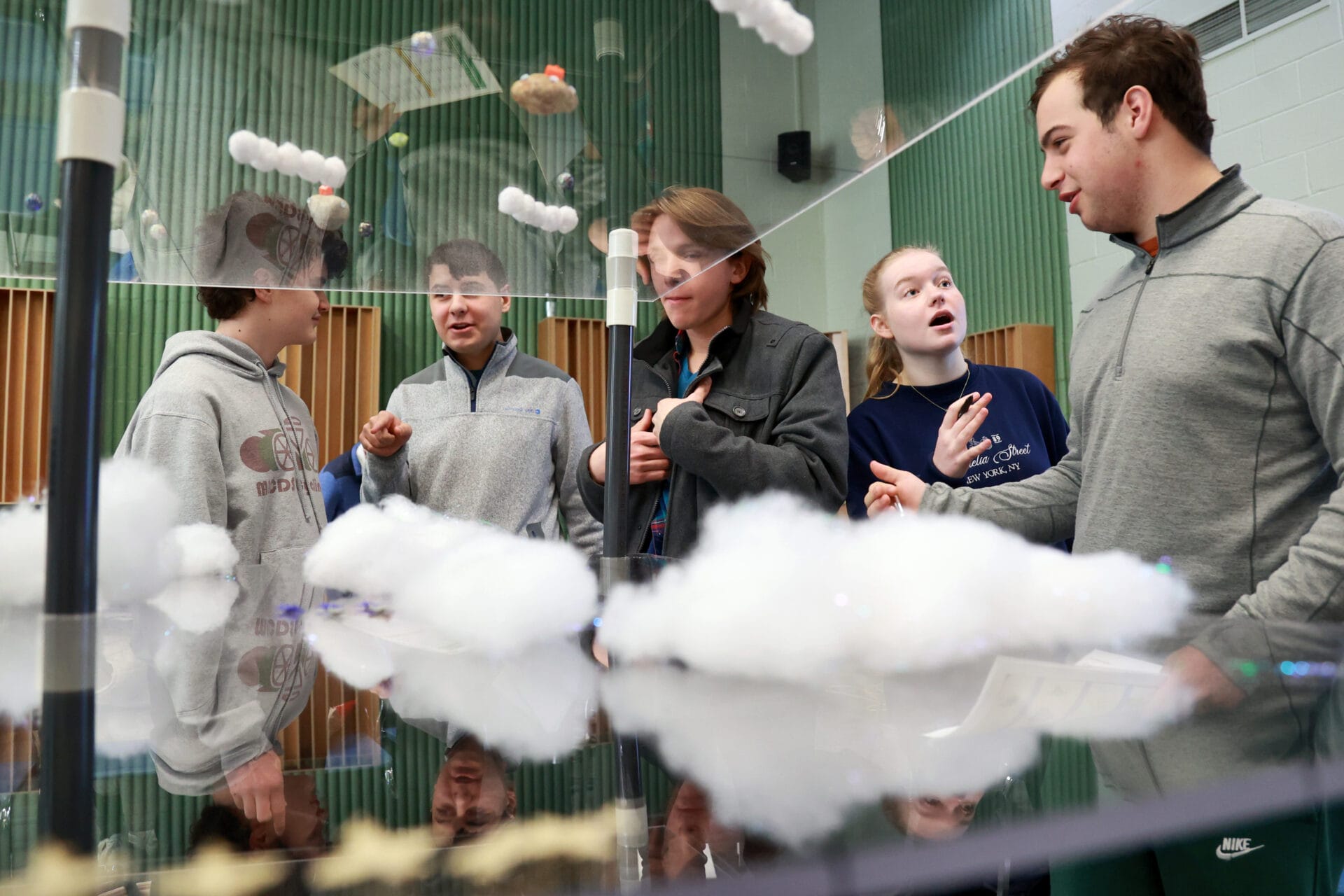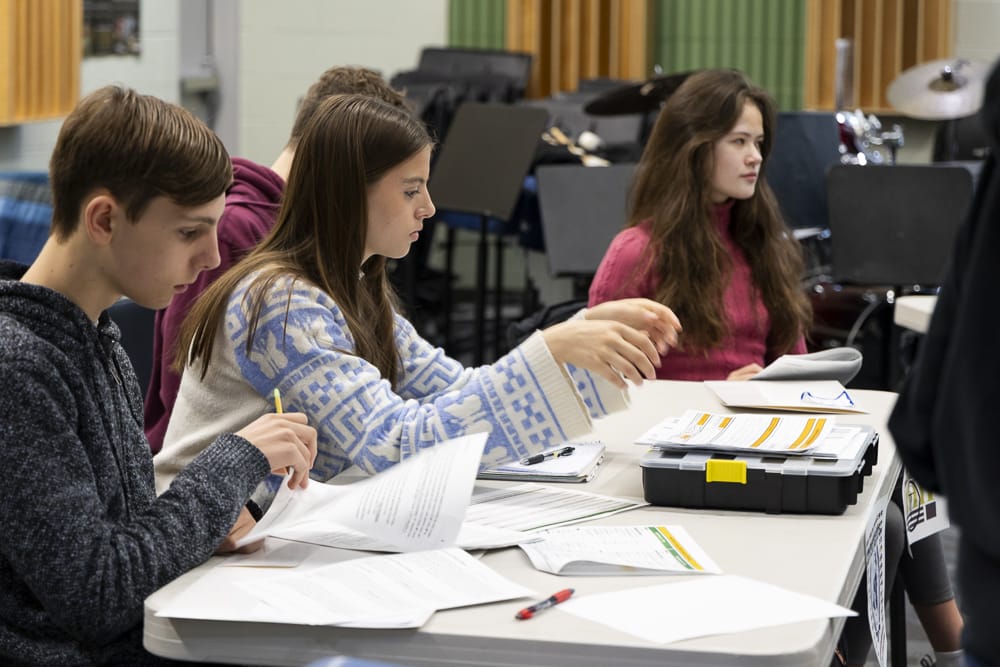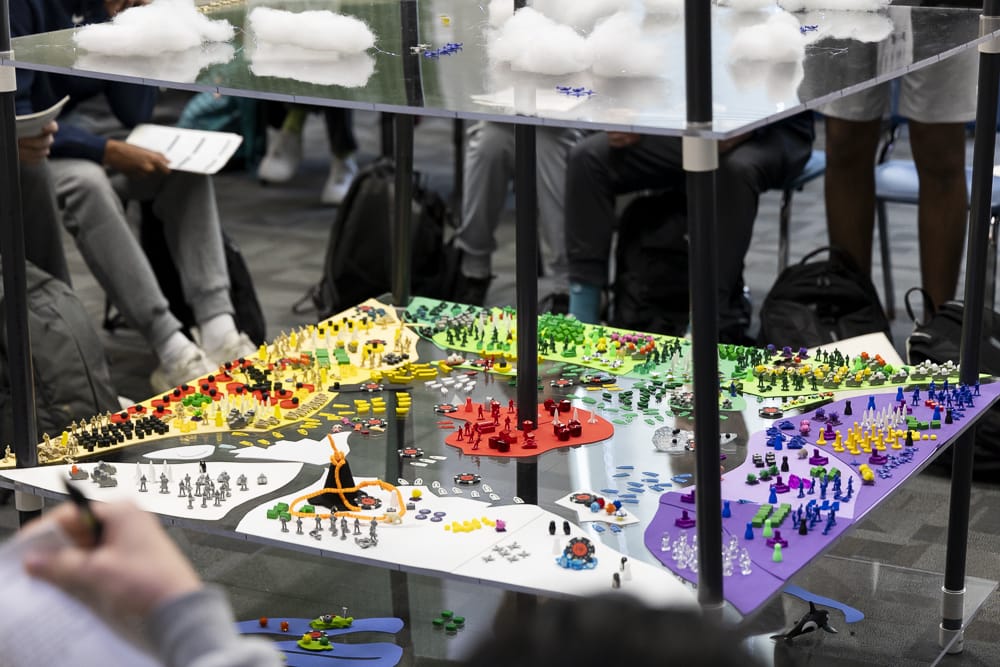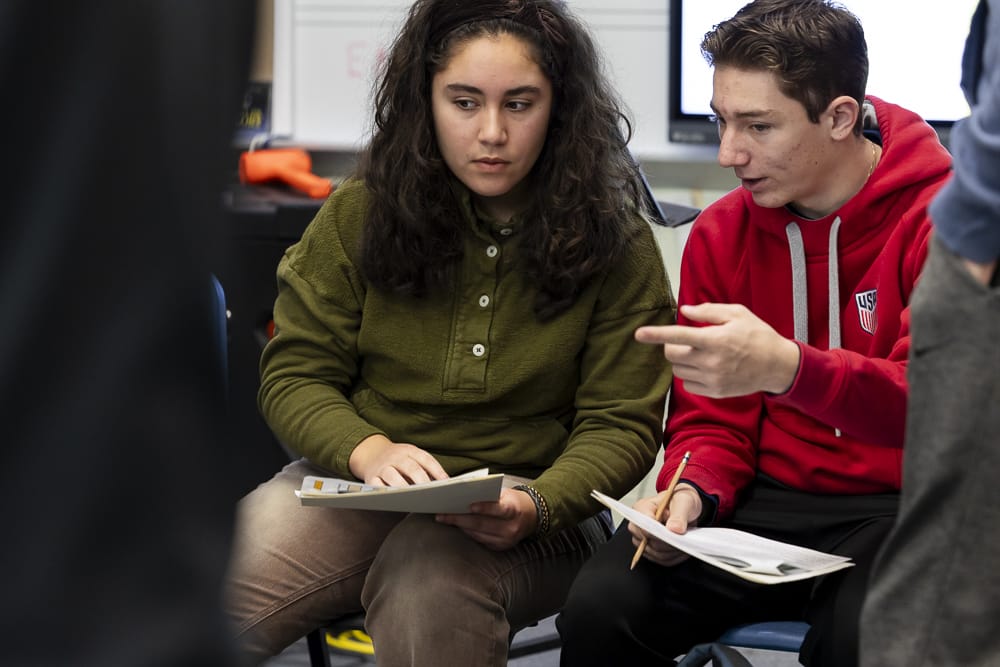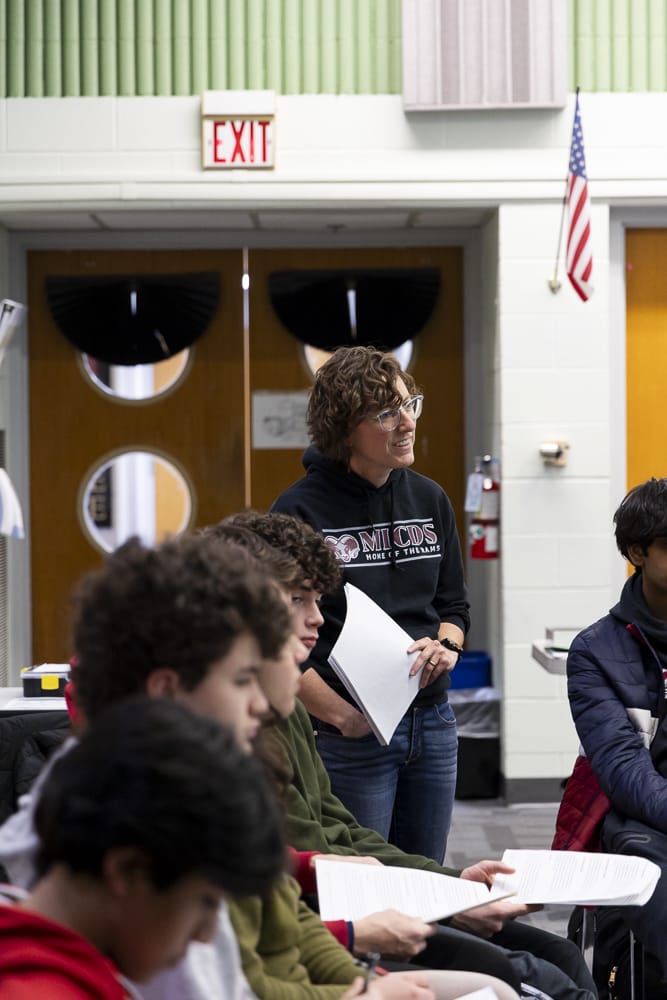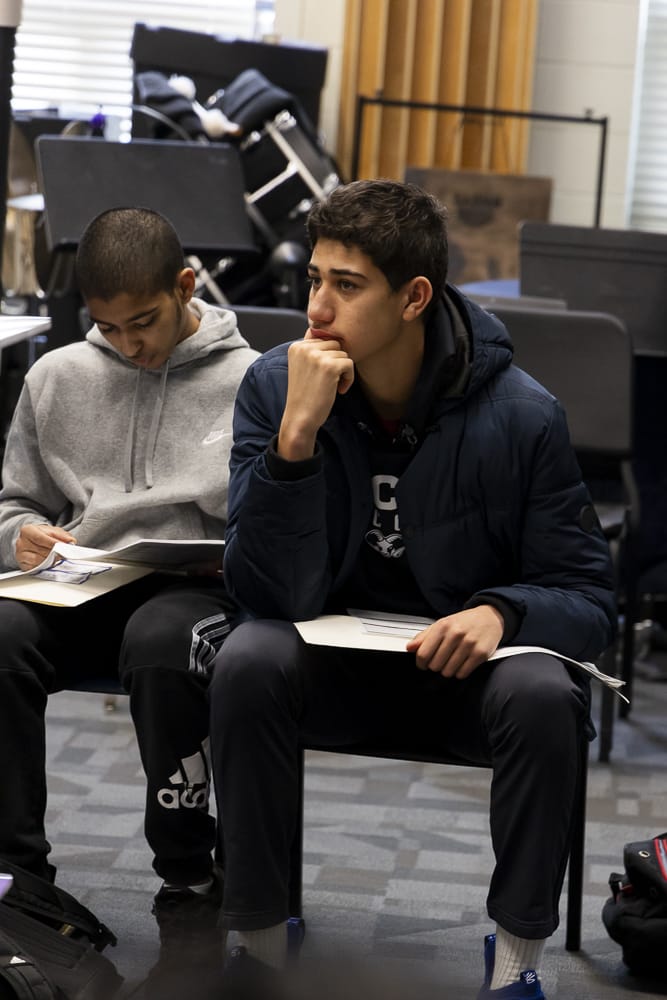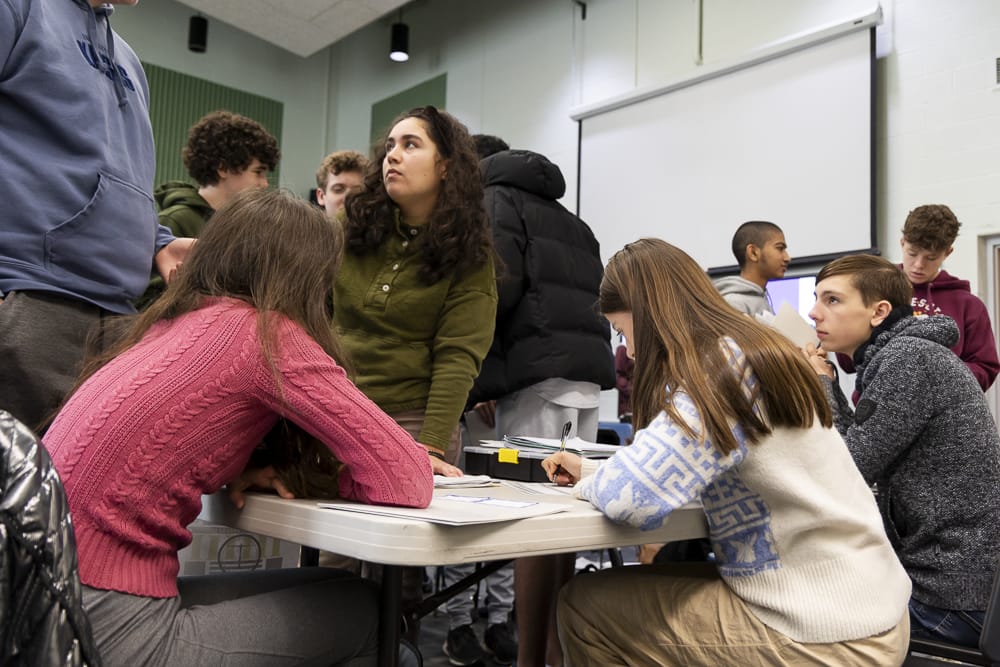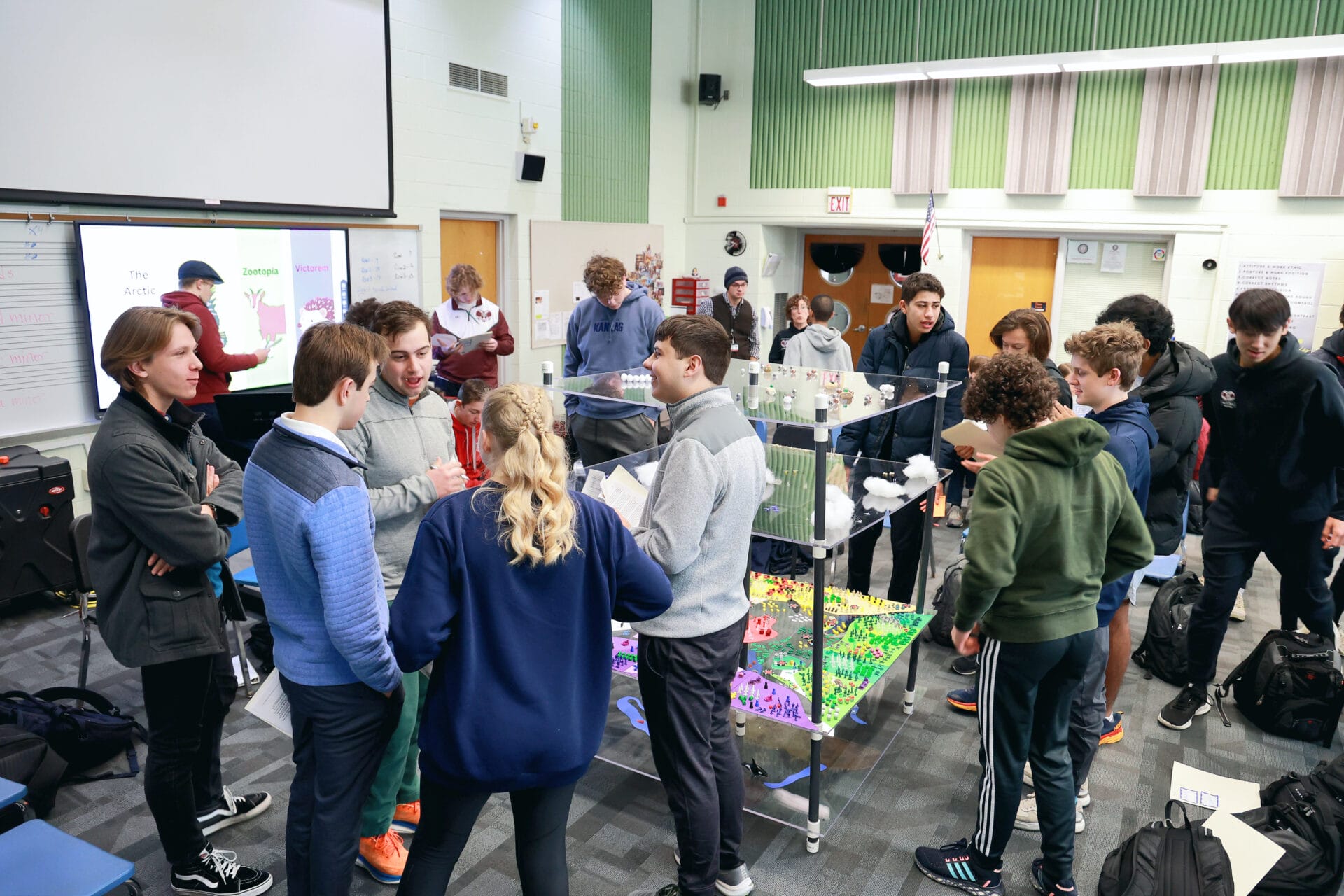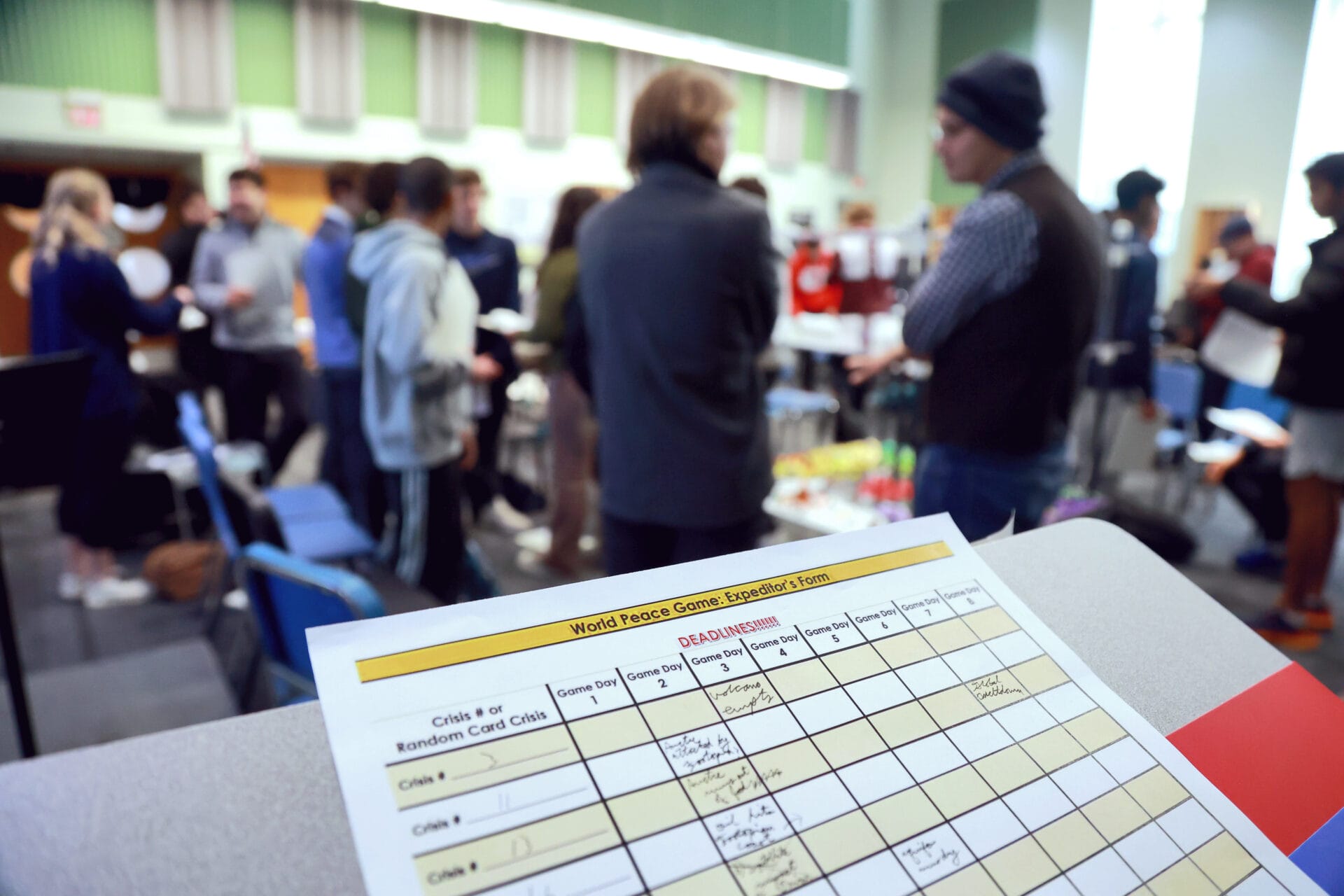Poverty, deforestation, pollution, inflation, and war—these are just some of the many profoundly large crises happening in the world today. Now imagine you’re an Upper School student at MICDS faced with solving these complex issues in only eight days during Winter Term. To help wrap your creative, problem-solving mind around this and many other complexities at stake, you’re introduced to the World Peace Game. The World Peace Game is « a hands-on political simulation that gives players the opportunity to explore the connectedness of the global community through the lens of the economic, social, and environmental crises and the imminent threat of war. The goal of the game is to extricate each country from dangerous circumstances and achieve global prosperity with the least amount of military intervention. »
« I was very excited to bring The World Peace Game to MICDS this Winter Term, » shares Courtney Check, Upper School English Teacher. « I first heard of The World Peace Game while I was getting my master’s in Curriculum and Instruction. In one of my courses regarding open-space classrooms and problem-based learning, we watched John Hunter’s TedTalk about the game. Years back when we started talking about Winter Term, I decided to give the game a try; it seemed like a perfect fit for the mission and vision of our Winter Term sessions.
« The Game is so complex. During it, students had to work together to resolve 24 complex crises that affect five different nations on the gameboard. The crises are pretty realistic: floating trash patches in the ocean, oil spills that threaten the coasts of several countries, border and resource disputes—it’s chaos! As a facilitator, I was hoping that the students could resolve the chaos, though I knew it would take time. »
Under the guidance of Ms. Check and David Armstrong, Upper School World Language Teacher, our ninth through 11th graders in this class jumped fully into this meaningful game. Throughout the game, they had to negotiate, advise, collaborate, argue, command, and innovate. « The students were totally engaged in their roles and the energy in the room was electrifying! Working with them totally reinvigorated my love for teaching and the creativity that it demands, » Check reflected.
What was Crisis 25? « We attempted to replicate a real-world issue that wasn’t represented already on the game board, » stated Oulamine. « Our conflict, ‘Religious Herbs,’ modeled an herb cultivated by a certain ethnic group and taken advantage of by underground, and potentially violent, black markets. We implemented true game mechanics with fines and consequences to simulate conflicts in the real world. Additionally, we aimed to simplify these subjects for younger audiences while simultaneously not invalidating the severity of a particular situation. »
Haas, on the winning crisis team, left the game with a newfound appreciation for compromise. « One of the biggest takeaways for me was the sheer amount of work it takes to come to a compromise between nations. In the World Peace Game, it took three game days to come to some agreements, equivalent to about 80 min of talking. In the real world, there are thousands of people talking and negotiating at the same time, causing chaos and increasing the time spent. »
Abhiram Madala ’26 explained the crisis his team designed: « Our team designed a killer pandemic crisis requiring multiple countries to work together to solve the issue. This issue was highly relevant to present-day crises, so we thought it was a great idea. » He also really embraced the game and all that it entailed. « I thoroughly enjoyed playing the World Peace Game. Throughout the Game, each country was constantly negotiating with another. Negotiation was a huge part of the game and an important lesson to take away is that it is important to be reasonable with negotiating, but you should always start with unfair offers and then whittle your way down until you find a good deal. Additionally, as the prime minister of the wealthiest nation, it was critical that I didn’t flaunt my power to wage war on other nations or spend too much money on unnecessary things. All countries had to work together to succeed, and, although there was a brief war, each country managed to find peace with one another and each country was able to raise their GDP at the end of the game, » he said. « [Also,] I generally tend to enjoy political/social simulations, so this course was my first option when I was picking my Winter Term courses. Ms. Check and Mr. Armstrong did a great job of conducting the game and allowed us to take over, instead of interfering. The game was very fun and I would certainly choose it again if it is offered next year. »
Oulamine also enjoyed the class. « Overall, it was a wonderful, thought-provoking class and a great use of MICDS’ Winter Term, » she stated. « For two weeks, I served as the United Nations Secretary-General after submitting a sort of ‘resume’ to the facilitators of the game. After being chosen for this role, the UN and I attempted to solve 24 unique crises on the tangible game board and benefit the four other student-led nations. Additionally, for the duration of the game, students read The Art of War by philosopher Sun Tzu to aid in our efforts for peace. The game required a creative mind, independence, problem-solving, composure in time-sensitive situations, interpersonal/communicative expertise, patience, and most importantly: adaptability.
« While it could get stressful at times, it was also fun — with news broadcasters opening the rounds (Max Thomas ’25) and multiple saboteurs at play. Interestingly, while the clear objective of the game was world peace, wars and attacks were launched by certain nations; only being called off when I announced it was the last game day to solve the crisis. Immediately, everyone refocused to win the game, and so perhaps the microcosm comments on the camaraderie of humankind: in the end, [the players/nations] would try to benefit the greater good despite previous turmoil. »
Reagan Hamilton ’25’s team designed a crisis that had to do with the astronomical layer of the game. « The crisis itself was an incoming asteroid that was heading toward one of the nation’s space satellites, » she explained. « If hit, the satellite would decommission all of the nation’s internet firewalls. To prevent the collision, the nation in question would need to enact a command from its Control and Communications center on the earth layer to decommission all of its satellites. The issue with this action is that it would decommission all of its satellites, not just the one in question, therefore losing considerable income from owning and operating the technology. We wanted to make the crisis involve more nations to complicate the situation, so we also added that if the nation who owns the satellite(s) chooses to not enact the decommission command, the three other nations would be able to prosecute the nation in the UN World Court. As a team, we felt that this crisis could have the potential to be fun and make students think of innovative solutions to solve the complex issue. »
Upon reflecting, Hamilton also had positive takeaways from the class experience. « The game was an incredible way to think about the many issues our generation will face as we grow up. These issues will be our responsibility to fix because so many of them will have impactful consequences in our lifetime. Overall, I thought that this activity was incredibly insightful into the way issues can be resolved while also being fun! » she said. « The biggest lesson that I learned during this course was how to communicate ideas effectively in a group setting. In my experience, it can be extremely difficult to get people to listen, so learning how to get people’s attention and share thoughts was an important lesson and a skill I can take with me in the future. Although I will be doing an internship, I hope this winter term class runs next year and more students get the chance to enjoy it. »
Thank you to Ms. Check and Mr. Armstrong for facilitating such an incredible game packed with a world of lessons! Thanks to this class, all of The World Peace Game students won a deeper, global perspective through Winter Term.
